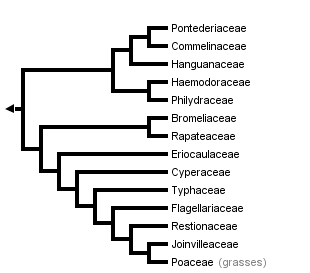Commelinanae
William J. Hahn


This tree diagram shows the relationships between several groups of organisms.
The root of the current tree connects the organisms featured in this tree to their containing group and the rest of the Tree of Life. The basal branching point in the tree represents the ancestor of the other groups in the tree. This ancestor diversified over time into several descendent subgroups, which are represented as internal nodes and terminal taxa to the right.

You can click on the root to travel down the Tree of Life all the way to the root of all Life, and you can click on the names of descendent subgroups to travel up the Tree of Life all the way to individual species.
For more information on ToL tree formatting, please see Interpreting the Tree or Classification. To learn more about phylogenetic trees, please visit our Phylogenetic Biology pages.
close boxIntroduction
The Commelinanae includes the grasses, sedges, bromeliads, and relatives. This superorder includes approximately 25 families, 1075 genera, and 24000 species.
Characteristics
The Commelinanae are characterized by scrobiculate pollen with operculate apertures and orthotropous ovules, girdle-like endothecial thickenings of the anthers, annulate pollen apertures, and apical placentation (Linder and Kellogg, 1993).
References
Linder, HP & EA Kellogg. 1995. Phylogenetic patterns in the commelinid clade. pp 473-496 in: PJ Rudall, PJ Cribb, DF Cutler & CJ Humphries (eds.). Monocotyledons: systematics and evolution. Royal Botanic Garden, Kew.
Title Illustrations

| Scientific Name | Pontederia |
|---|---|
| Image Use |
 This media file is licensed under the Creative Commons Attribution-NonCommercial License - Version 3.0. This media file is licensed under the Creative Commons Attribution-NonCommercial License - Version 3.0.
|
| Copyright |
© 1997

|
| Scientific Name | Phragmites australis (Cav.) Steudel |
|---|---|
| Image Use |
 This media file is licensed under the Creative Commons Attribution-NonCommercial License - Version 3.0. This media file is licensed under the Creative Commons Attribution-NonCommercial License - Version 3.0.
|
| Copyright |
© 1997

|
| Scientific Name | Tillandsia usneoides L. |
|---|---|
| Image Use |
 This media file is licensed under the Creative Commons Attribution-NonCommercial License - Version 3.0. This media file is licensed under the Creative Commons Attribution-NonCommercial License - Version 3.0.
|
| Copyright |
© 1997

|
About This Page

Georgetown University, Washington, D. C., USA
Correspondence regarding this page should be directed to William J. Hahn at
Page copyright © 1997
 Page: Tree of Life
Commelinanae.
Authored by
William J. Hahn.
The TEXT of this page is licensed under the
Creative Commons Attribution-NonCommercial License - Version 3.0. Note that images and other media
featured on this page are each governed by their own license, and they may or may not be available
for reuse. Click on an image or a media link to access the media data window, which provides the
relevant licensing information. For the general terms and conditions of ToL material reuse and
redistribution, please see the Tree of Life Copyright
Policies.
Page: Tree of Life
Commelinanae.
Authored by
William J. Hahn.
The TEXT of this page is licensed under the
Creative Commons Attribution-NonCommercial License - Version 3.0. Note that images and other media
featured on this page are each governed by their own license, and they may or may not be available
for reuse. Click on an image or a media link to access the media data window, which provides the
relevant licensing information. For the general terms and conditions of ToL material reuse and
redistribution, please see the Tree of Life Copyright
Policies.
Citing this page:
Hahn, William J. 1997. Commelinanae. Version 01 January 1997 (under construction). http://tolweb.org/Commelinanae/21340/1997.01.01 in The Tree of Life Web Project, http://tolweb.org/





 Go to quick links
Go to quick search
Go to navigation for this section of the ToL site
Go to detailed links for the ToL site
Go to quick links
Go to quick search
Go to navigation for this section of the ToL site
Go to detailed links for the ToL site